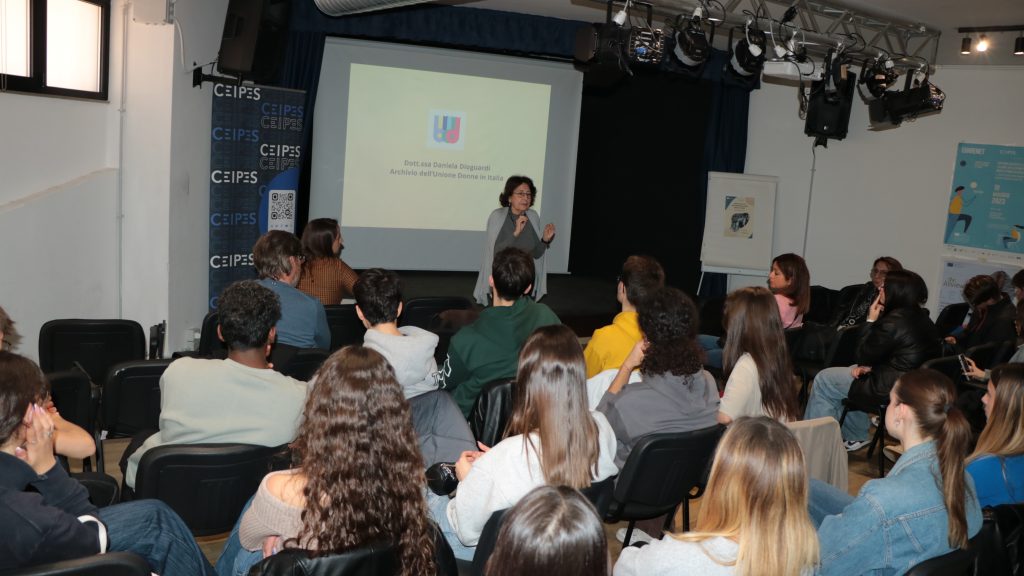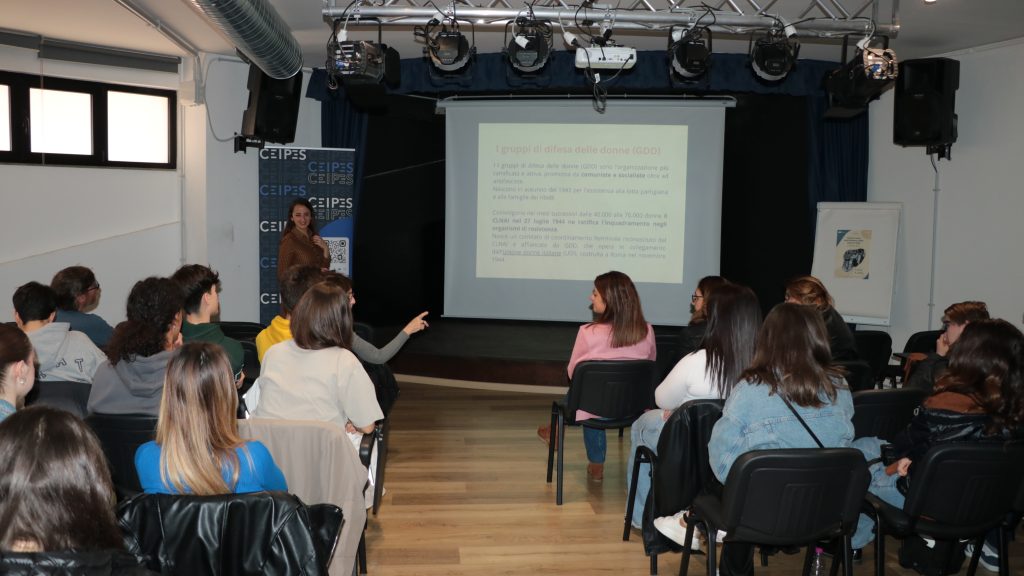
Networks of Women Solidarity
CEIPES ETS implements the Memory forum on women Resistance, Networks of women solidarity, on the 20th of March 2024. The activity is envisaged in the WP2, activity 2.4. The event took place at CEIPES ETS office in Palermo, Via Francesco Maria Alias, 20. It started at 10.30 and lasted until 13.00.
The memory forum was organised with the aim of raising awareness of the largely forgotten history of women in the Resistance to Nazi-Fascism.
The event was attended by four fourth classes of the high school “Ninni Cassarà” of Palermo, students accompanied by their teachers, with whom a participating debate was created on the roles of women in the times of the Resistance and today.

Thus, there were 50 people, 48 participants added to 2 speakers: Francesca Morganella and Daniela Dioguardi.
Therefore in the first part of the forum, Francesca Morganella, the project manager of SOLREM project on behalf of CEIPES ETS, presented the resistant stories of many women that joined the Resistance movement, exploring the various reasons of their choice, the different profiles of women, indeed they were mostly farmers, but also nuns and well educated women.
Women participation in Resistance has been documented starting from the 70’s thanks to feminist historians, they have brought to light the testimonies of women who joined the Resistance and played a fundamental role, risking their lives, as relay girls (carrying messages, explosives) for sabotage, strikes, taking care of partisan comrades, some women took part in the armed struggle, but most of them participated very courageously in the civil resistance.
Furthermore, the forum had a guest speaker, Dr. Daniela Dioguardi, feminist activist and representative of the Women’s Library and Legal Advice Centre – Udipalermo onlus.
The activist recounted the history of the “Unione Donne in Italia”, the feminist association founded to gather women of the Resistance, communists, socialists and anti-fascists in 1944.
The speakers underlined the importance of the voluntarist aspect of women’s resistance and the patriarchal mechanism against which women struggled for many years to reach the right to vote after the end of the II World War, and the contemporary issues against which there is a strong need to focus and struggle nowadays.
As a matter of fact, the historian Claudio Pavone, in 1944-45 Italy, theorised the “double war of women” against the Nazi-Fascists and against patriarchal society. A conflict that operates in addition to others, civil, national and class liberation. War fought for one’s own emancipation. An extended connotation of civil resistance is that which sees them fighting on their own in the aftermath of the outbreak of war, against caravans, hunger, care of family members and the elderly, all entrusted to them while their men are soldiers or prisoners. Forced to come out of the private sphere, to make their voices heard with strikes, demonstrations and joint actions, women hitherto excluded from the public sphere begin to gain awareness and develop a political consciousness. War, in this analysis, appears to be the first great subverter of traditional social hierarchies and the ‘midwife’ of change.

These theories, together with other historian publications, such as Anna Bravo, Annamaria Bruzzone, Rachele Farina, Marcello Flores and others have been taken into consideration and mentioned during the discussions.
In addition, Renato Viganò’s book “L’Agnese va a morire”, written by Garibaldina Renata Viganò and published by Einaudi in 1949, was mentioned. In particular, during the presentation, reference was made to the 1976 film of the same name, directed by Giuliano Montaldo. A scene from this film was the starting point for a dialogue with the participants, to discuss the value of the participation of women in the Resistance, who were excluded from the celebration of freedom in the aftermath of the liberation of Italy and who are regaining value over time thanks to the work of the historians who collected them.
